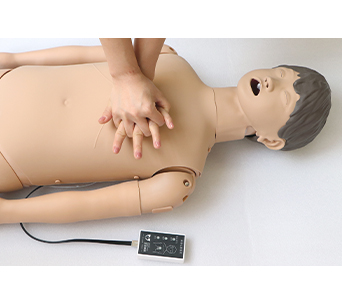■ The simulator is made of polymer materials, which are environmentally friendly and pollution-free; The anatomical landmarks are obvious and can touch the nipples, ribs, sternum, and xiphoid process, making it easy to operate and locate.
■ The anatomical position of the simulated human head and neck is accurate, and the head can swing left and right with a horizontal rotation of 180 degrees, making it easy to remove oral foreign objects, and the mandibular joint can move.
■ Pupil teaching: One side of the pupil is dilated and the other side is normal.
■ Implementation standard for cardiopulmonary resuscitation: 2020 American Heart Association Cardiopulmonary Resuscitation and Cardiovascular Emergency Guidelines
■ There are three feasible methods to open the airway: lifting the chin, neck, and jaw with both hands; When the simulator does not have an open airway, the airway is closed and only when it is open can air be blown in; Oral to oral artificial respiration or the use of a simple respirator to assist breathing, effective artificial respiration can reveal chest undulations.
■ Equipped with an electronic display, the chest can be pressed with a depth range of 0-7cm, and there are indicator lights for correct pressing, excessive pressing, and insufficient pressing. There are indicator lights for correct blowing, excessive blowing, and insufficient blowing.
■ There is a guiding sound with a pressing frequency of 110 times per minute, which can be turned on or off.
■ When the frequency guide sound is turned on, the guide sound will automatically sound when there is a press, and it will stop automatically when the press is stopped. Prevent excessive noise.










